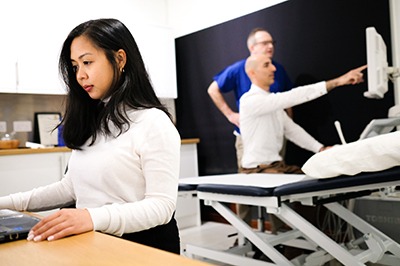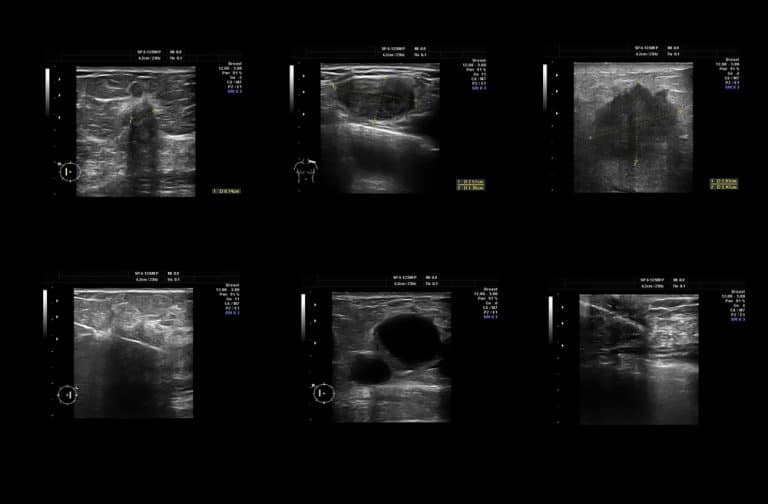London's relationship with healthcare has transformed dramatically over the past decade. Walk through any of the capital's business districts and you'll encounter conversations about private health checks, preventative screening, and proactive wellness strategies. This shift represents more than just a trend – it reflects a fundamental change in how Londoners approach their health and wellbeing.
The numbers tell a compelling story. Searches for 'private health check' grew by almost 60% between 2019 and 2022 across the UK, with London leading this surge in demand. Post-COVID-19, 38% of UK adults now prioritize full-body checkups annually, a dramatic increase from pre-pandemic levels. This cultural shift toward preventative healthcare has positioned ultrasound screening at the forefront of London's health consciousness revolution.

The Perfect Storm: NHS Pressures and London Living
London's unique position as both a global financial center and a city with significant healthcare challenges creates the perfect environment for preventative screening adoption. The capital's residents face a complex web of factors that drive them toward proactive health management, from NHS capacity constraints to the specific health risks associated with urban living.
NHS waiting times across London hospitals paint a stark picture of healthcare accessibility challenges. Current data shows that less than 60% of patients receive treatment within the 18-week standard, falling well short of the 65% target. For Londoners experiencing health concerns, these delays can feel interminable. A 45-year-old investment banker in Canary Wharf experiencing abdominal discomfort faces the prospect of waiting months for an NHS ultrasound appointment, while their symptoms persist and anxiety mounts.
The psychological impact of these delays extends far beyond mere inconvenience. Research from Hestia's 2025 London Mental Health Index reveals that 40% of Londoners felt nervous, anxious or on edge, up from 36% in 2024. Health-related anxiety forms a significant component of this trend, with many Londoners reporting that uncertainty about their health status creates persistent stress that affects their work performance and personal relationships.
Private healthcare revenue in London reached £4.9 billion in 2023, driven largely by NHS waiting lists and the desire for immediate access to diagnostic services. This growth reflects not just financial capability but a fundamental shift in health priorities among London's diverse population. The city's high earners, from tech entrepreneurs in Shoreditch to legal professionals in the City, increasingly view preventative screening as an investment in their long-term productivity and quality of life.
The London Lifestyle: Health Risks That Demand Proactive Monitoring
London's unique environmental and lifestyle factors create specific health risks that make preventative ultrasound screening particularly relevant for the capital's residents. The city's air pollution levels, while improving, still pose significant health challenges that many Londoners are only beginning to understand.
Research from Queen Mary University of London has demonstrated clear links between the capital's air pollution and various health outcomes, including liver inflammation and kidney function decline. Particulate matter from London's busy roads doesn't just affect respiratory health – it creates systemic inflammation that can impact abdominal organs in ways that may not become apparent for years. Londoners living near major transport routes like the A40, M25, or central London's congested streets face elevated risks that traditional NHS screening programs don't specifically address.
The stress patterns associated with London living create another layer of health risk that drives preventative screening adoption. The capital's demanding work culture, with its long hours and high-pressure environments, contributes to stress-related conditions that affect digestive health, liver function, and cardiovascular wellbeing. A senior consultant at a major London hospital might work 70-hour weeks while commuting two hours daily, creating chronic stress patterns that increase their risk of developing conditions like fatty liver disease or hypertension.
London's diverse food culture, while one of the city's greatest assets, also creates unique dietary challenges. The abundance of international cuisines, combined with irregular eating patterns driven by demanding work schedules, can contribute to digestive health issues and metabolic disorders. Many Londoners find themselves eating late dinners, skipping meals during busy periods, or relying heavily on processed foods – patterns that increase the risk of gallbladder disease, fatty liver, and other conditions that ultrasound screening can detect early.
The city's housing situation adds another dimension to health risk. London's high property costs force many residents into smaller living spaces, often with limited cooking facilities or storage for fresh food. The stress of housing costs, which can consume 40-50% of household income, creates chronic financial pressure that manifests in physical health symptoms. Young professionals sharing cramped accommodations in zones 3-6 while commuting long distances face a combination of environmental, financial, and lifestyle stresses that traditional health screening programs weren't designed to address.
The Demographic Drivers: Who's Leading London's Screening Revolution
London's preventative ultrasound screening adoption follows distinct demographic patterns that reflect both the city's economic structure and its diverse population's varying health needs and cultural attitudes toward preventative care.
Professional women aged 30-45 represent the largest segment driving preventative screening demand in London. This demographic faces unique health challenges that make ultrasound screening particularly appealing. Career-focused women in London's financial, legal, and tech sectors often delay childbearing while building their careers, creating specific health monitoring needs around reproductive health and fertility. The stress of balancing demanding careers with family planning creates anxiety about conditions like ovarian cysts, fibroids, or thyroid disorders that ultrasound can detect and monitor.
The cultural shift toward health optimization among London's professional class reflects broader changes in how success is defined and measured. Where previous generations might have prioritized career advancement above all else, today's London professionals increasingly view health as a prerequisite for sustained high performance. A 38-year-old marketing director in Shoreditch might schedule quarterly ultrasound screenings not because of specific symptoms, but as part of a comprehensive approach to maintaining peak performance in a competitive industry.
London's international business community brings different cultural attitudes toward preventative healthcare that influence screening adoption patterns. Executives from countries with strong preventative healthcare traditions, particularly from Germany, Japan, and Scandinavia, often seek to maintain their home country's screening practices while working in London. This creates demand for comprehensive health monitoring that goes beyond what the NHS typically provides for asymptomatic individuals.
The city's growing population of health-conscious millennials and Gen Z professionals represents another key demographic driving screening adoption. This generation, having grown up with access to health information online, approaches healthcare with a more proactive mindset than previous generations. They view preventative screening as a natural extension of their fitness tracking, nutrition monitoring, and mental health awareness practices.
Ethnic communities across London show varying patterns of preventative screening adoption that reflect both cultural attitudes toward healthcare and specific health risks. South Asian communities, facing higher rates of diabetes and cardiovascular disease, increasingly seek preventative screening to monitor for early signs of these conditions. The cultural emphasis on family health and intergenerational responsibility within these communities often drives screening decisions, with younger family members arranging preventative checks for older relatives.

Technology and Accessibility: Making Screening Convenient for London Life
The evolution of ultrasound technology and service delivery models has made preventative screening more accessible and appealing to London's time-pressed population. Modern ultrasound equipment produces higher quality images with shorter examination times, making screening more efficient and comfortable for patients with busy schedules.
Mobile ultrasound services have emerged as a particularly popular option for London's professional community. These services bring screening directly to workplaces, eliminating the need for time-consuming travel across the city. A law firm in the City might arrange for on-site ultrasound screening for its partners and senior associates, allowing them to maintain their health monitoring without disrupting their billable hour targets.
Evening and weekend appointment availability has become a standard offering among London's private ultrasound providers, recognizing that traditional 9-5 healthcare delivery doesn't align with modern work patterns. Many Londoners prefer Saturday morning appointments that don't interfere with their work commitments, or early evening slots that fit around their commuting schedules.
The integration of ultrasound screening with comprehensive health assessment packages appeals to London's efficiency-minded population. Rather than scheduling separate appointments for different health checks, many Londoners opt for comprehensive screening packages that include ultrasound alongside blood tests, cardiovascular assessments, and other preventative measures. This approach maximizes the health information gained while minimizing the time investment required.
Digital health platforms have revolutionized how Londoners access and manage their preventative screening. Online booking systems, digital health records, and telemedicine consultations make it easier to integrate screening into busy lifestyles. Many London professionals appreciate being able to book appointments, receive results, and consult with healthcare providers through digital platforms that work around their schedules.
The Economics of Prevention: Cost-Benefit Analysis for London Residents
The financial considerations driving preventative ultrasound screening adoption in London reflect both the city's high earning potential and the significant costs associated with treating advanced disease. For many Londoners, the economics of prevention make compelling sense when viewed through the lens of long-term financial planning.
Private ultrasound screening costs in London typically range from £150-400 depending on the comprehensiveness of the examination and the provider's location. While this represents a significant expense for many, London's high average salaries make preventative screening financially accessible to a substantial portion of the population. A senior software engineer earning £80,000 annually might view quarterly screening as a reasonable investment in maintaining their earning capacity.
The opportunity cost of illness becomes particularly significant for London's high earners. A week off work for a senior consultant or investment banker can represent thousands of pounds in lost income, not including the potential career impact of extended absence. Early detection of conditions through preventative screening can prevent the need for emergency treatment and extended recovery periods that would significantly impact earning potential.
London's private health insurance market has evolved to support preventative screening, with many employers offering comprehensive health packages that include annual screening as a standard benefit. Tech companies, financial services firms, and consulting practices increasingly view preventative healthcare as a competitive advantage in attracting and retaining top talent. The cost of providing annual ultrasound screening for employees is often offset by reduced sick leave and improved productivity.
The psychological value of peace of mind represents another economic consideration that many Londoners factor into their screening decisions. The stress and anxiety associated with health uncertainty can impact work performance, relationships, and overall quality of life in ways that are difficult to quantify but nonetheless real. For many London professionals, the cost of preventative screening is justified by the mental health benefits of knowing their health status.
Cultural Shifts: From Reactive to Proactive Healthcare
London's adoption of preventative ultrasound screening reflects broader cultural shifts in how the city's residents approach health and wellness. The traditional British approach of "keeping calm and carrying on" through health concerns is giving way to a more proactive, information-seeking mindset that prioritizes early detection and prevention.
Social media and digital health information have played significant roles in driving this cultural shift. London's highly connected population regularly encounters health information through professional networks, social media platforms, and wellness-focused content. Stories of early detection success, shared through personal networks or online communities, create awareness and motivation for preventative screening that didn't exist in previous generations.
The influence of London's international business community has introduced different cultural approaches to preventative healthcare. Executives and professionals from countries with strong preventative healthcare traditions bring these practices to London, creating demand for services that match their home country experiences. This cross-cultural pollination of health practices has elevated the standard of preventative care expected by London's professional community.
Workplace wellness culture has evolved significantly across London's major industries, with preventative health screening becoming a standard component of comprehensive employee benefits packages. The competition for talent in London's key sectors has driven employers to offer increasingly sophisticated health and wellness benefits, including annual health screenings, mental health support, and preventative care allowances.
The COVID-19 pandemic accelerated many of these cultural shifts, creating heightened awareness of health vulnerability and the importance of early detection. Many Londoners who had never previously considered preventative screening began seeking proactive health monitoring as part of their post-pandemic health strategy. The experience of healthcare system strain during the pandemic also highlighted the value of maintaining good health to avoid the need for emergency care during crisis periods.
Specific Health Concerns Driving London's Screening Adoption
London's unique demographic and environmental characteristics create specific health concerns that make ultrasound screening particularly relevant and valuable for the city's residents. Understanding these concerns helps explain why preventative screening has gained such traction among different segments of London's population.
Liver health represents a primary concern driving ultrasound screening adoption across London's diverse communities. The city's work culture, with its emphasis on networking events, client entertainment, and stress management through alcohol consumption, creates elevated risks for liver disease that many professionals are beginning to recognize. Non-alcoholic fatty liver disease affects an estimated one in five people across the UK, but prevalence rates in London may be higher due to the combination of stress, irregular eating patterns, and sedentary work environments common in the capital's major industries.
South Asian communities in London face particularly elevated risks for metabolic conditions that ultrasound screening can detect early. Research consistently shows that people of South Asian descent develop type 2 diabetes at younger ages and lower body weights than other populations, often accompanied by fatty liver disease and other metabolic complications. The cultural dietary patterns, genetic predisposition, and lifestyle factors common in London's South Asian communities create specific health risks that preventative screening can address before symptoms develop.
Reproductive health concerns drive significant demand for preventative ultrasound screening among London's professional women. The city's career-focused culture often leads to delayed childbearing, creating anxiety about fertility and reproductive health that regular screening can address. Conditions like ovarian cysts, fibroids, and thyroid disorders can significantly impact fertility and pregnancy outcomes, making early detection through ultrasound screening particularly valuable for women planning families while managing demanding careers.
Cardiovascular health represents another major concern driving screening adoption, particularly among London's high-stress professional population. The combination of long working hours, high-pressure environments, irregular meal patterns, and limited exercise time creates cardiovascular risk factors that many Londoners recognize and seek to monitor proactively. Ultrasound screening can detect early signs of cardiovascular disease, including carotid artery changes and abdominal aortic abnormalities, before symptoms develop.
Thyroid disorders show elevated prevalence in urban populations, possibly related to stress, environmental factors, and dietary patterns common in major cities like London. The symptoms of thyroid dysfunction – fatigue, weight changes, mood alterations – can significantly impact work performance and quality of life, making early detection through ultrasound screening particularly valuable for London's productivity-focused population.
The Provider Landscape: Meeting London's Screening Demands
London's preventative ultrasound screening market has evolved rapidly to meet growing demand, creating a diverse ecosystem of providers that cater to different segments of the city's population. This evolution reflects both the sophistication of London's healthcare market and the varying needs and preferences of its diverse residents.
Harley Street remains the traditional center of London's private healthcare market, with established clinics offering comprehensive screening packages that combine ultrasound with other diagnostic modalities. These providers typically serve London's highest earners and international clients, offering luxury amenities and concierge-level service that justify premium pricing. The appeal extends beyond mere convenience – many clients value the discretion, personalized attention, and comprehensive reporting that these established providers offer.
Corporate health providers have emerged as a significant force in London's preventative screening market, partnering with major employers to offer on-site or near-site screening services. These providers understand the unique needs of London's business community, offering flexible scheduling, rapid results reporting, and integration with existing employee health programs. A major consulting firm might contract with a corporate health provider to offer annual screening to all employees above a certain level, recognizing the business value of maintaining a healthy workforce.
Technology-focused providers have disrupted traditional healthcare delivery models by offering streamlined, efficient screening services that appeal to London's tech-savvy population. These providers typically emphasize online booking, digital health records, rapid results delivery, and transparent pricing. They often locate their facilities in convenient locations near transport hubs or business districts, making screening accessible to busy professionals who value efficiency and convenience.
Community-based providers serve London's diverse ethnic communities, offering culturally sensitive screening services that address specific health concerns and cultural preferences. These providers often employ multilingual staff, understand cultural dietary patterns and health beliefs, and tailor their services to address the specific health risks faced by different ethnic communities. A provider serving London's Turkish community might focus on gallbladder and liver health screening, while one serving South Asian communities might emphasize metabolic health monitoring.
Mobile screening services represent the newest evolution in London's preventative healthcare market, bringing ultrasound screening directly to workplaces, homes, or convenient community locations. These services appeal particularly to time-pressed professionals who struggle to fit healthcare appointments into their schedules. The convenience factor often outweighs the premium pricing, especially for high earners who value time over cost savings.
Quality and Regulation: Ensuring Standards in London's Private Market
The rapid growth of London's preventative ultrasound screening market has raised important questions about quality assurance and regulatory oversight. Unlike NHS services, which operate under standardized protocols and quality frameworks, private screening providers operate with varying levels of oversight and standardization.
Professional accreditation has become increasingly important as the market matures. Leading providers seek accreditation from organizations like the Care Quality Commission (CQC), the British Medical Ultrasound Society (BMUS), and other professional bodies that establish quality standards and oversight mechanisms. These accreditations provide reassurance to consumers and help differentiate quality providers from those offering substandard services.
Operator qualifications vary significantly across London's private screening market. The best providers employ consultant radiologists or experienced sonographers with specialized training in preventative screening, while others may use less qualified operators to reduce costs. This variation in expertise can significantly impact diagnostic accuracy and the value of screening services, making provider selection crucial for consumers.
Equipment quality and maintenance represent another important quality consideration. Leading providers invest in state-of-the-art ultrasound equipment and maintain rigorous quality assurance programs, while budget providers may use older equipment or defer maintenance to reduce costs. The quality of ultrasound equipment directly impacts image quality and diagnostic accuracy, making this a crucial factor in provider selection.
Reporting standards and follow-up protocols vary widely across London's private screening market. The best providers offer comprehensive written reports, clear explanations of findings, and structured follow-up protocols for abnormal results. They also maintain clear referral pathways to specialist care when needed. Less sophisticated providers may offer minimal reporting or unclear follow-up guidance, potentially compromising the value of screening services.
Integration with ongoing healthcare represents a crucial quality consideration that many consumers overlook. Leading providers work to integrate screening results with patients' existing healthcare relationships, communicating with GPs and specialists as appropriate. This integration ensures that screening results inform ongoing healthcare decisions and that any necessary follow-up care is properly coordinated.
Patient Experiences: Real Stories from London's Screening Adopters
The human stories behind London's preventative screening trend reveal the diverse motivations and experiences that drive this healthcare revolution. These personal accounts illustrate how preventative ultrasound screening fits into the complex lives of London's residents and the value they derive from proactive health monitoring.
Sarah, a 42-year-old partner at a major London law firm, began annual ultrasound screening after a colleague's early-stage ovarian cancer diagnosis. Working 70-hour weeks while trying to conceive her second child, Sarah valued the peace of mind that regular screening provided. "I can't afford to ignore my health," she explains. "The screening takes two hours twice a year, but it gives me confidence that I'm monitoring the things that matter most for my long-term health and fertility."
David, a 38-year-old investment banker in Canary Wharf, started preventative screening after experiencing persistent fatigue and digestive issues that his GP attributed to stress. Private ultrasound screening revealed early-stage fatty liver disease, prompting lifestyle changes that significantly improved his symptoms and energy levels. "The NHS would have waited until I had serious symptoms," David notes. "Private screening caught this early enough that I could address it through diet and exercise rather than medication."
Priya, a 45-year-old tech entrepreneur originally from Mumbai, brings cultural expectations of preventative healthcare from her home country to her London practice. She schedules comprehensive health screening every six months, including ultrasound, as part of her family's health management strategy. "In India, preventative screening is normal for people in our income bracket," she explains. "I was surprised that it wasn't standard practice here, so I sought out private providers who could meet our family's health monitoring needs."
James, a 52-year-old creative director, began screening after his father's sudden death from an undiagnosed abdominal aortic aneurysm. The family history created anxiety about his own cardiovascular health that regular screening helps manage. "I know the statistics about men avoiding healthcare," James says. "But losing my father made me realize that ignorance isn't bliss when it comes to health. The screening gives me actionable information about my health status."
Maria, a 35-year-old consultant originally from Spain, uses preventative screening to maintain the health monitoring practices she was accustomed to in her home country. Working in London's demanding consulting environment, she views health screening as essential infrastructure for maintaining her performance and career trajectory. "In Spain, this level of health monitoring is normal," Maria explains. "I wasn't willing to lower my health standards just because I moved to London."
The NHS Response: Adapting to Changing Patient Expectations
London's NHS trusts have begun responding to the growing demand for preventative screening, recognizing that patient expectations have evolved beyond traditional reactive healthcare models. This response reflects both the pressure created by private sector competition and the recognition that preventative care can improve long-term health outcomes while reducing system costs.
Several London NHS trusts have expanded their health check programs to include more comprehensive screening options for patients at elevated risk. These programs typically target specific demographic groups or risk factors, offering enhanced screening to patients who might otherwise seek private care. The challenge lies in balancing resource allocation between treating existing patients and providing preventative services to healthy individuals.
NHS innovation programs across London have begun exploring new models of preventative care delivery that could make screening more accessible while maintaining quality standards. These initiatives often involve partnerships with private providers, technology companies, or community organizations to deliver screening services more efficiently and cost-effectively.
The integration of private screening results into NHS care pathways has become increasingly important as more Londoners undergo private preventative screening. NHS providers must develop protocols for incorporating private screening results into patient care plans and ensuring appropriate follow-up for abnormal findings detected through private screening.
Training and workforce development programs within London's NHS trusts increasingly emphasize preventative care and early detection skills. This reflects recognition that the healthcare workforce must adapt to changing patient expectations and the growing emphasis on prevention over treatment.
Quality assurance and standardization efforts aim to ensure that preventative screening, whether delivered through NHS or private providers, meets consistent quality standards. This includes developing standardized protocols, training requirements, and outcome measures that can be applied across different provider types.
Technology and Innovation: The Future of London's Screening Landscape
Technological advances continue to reshape London's preventative ultrasound screening landscape, making screening more accurate, efficient, and accessible while reducing costs and improving patient experience. These innovations promise to further accelerate screening adoption while improving health outcomes.
Artificial intelligence applications in ultrasound imaging show particular promise for improving diagnostic accuracy and consistency in preventative screening. AI-assisted image analysis can help identify subtle abnormalities that might be missed by human operators, while also providing quality assurance and standardization across different providers and operators. Several London providers are already piloting AI-enhanced screening programs with promising early results.
Point-of-care ultrasound technology continues to improve, making high-quality screening possible in non-traditional healthcare settings. Portable ultrasound devices now offer image quality that rivals traditional hospital-based equipment, enabling screening in workplace settings, community centers, or patients' homes. This technological evolution supports the growth of mobile screening services and workplace health programs.
Telemedicine integration allows for remote consultation and results interpretation, making specialist expertise more accessible while reducing costs. Patients can receive screening from local providers while having results interpreted by specialists located anywhere in London or beyond. This model particularly benefits patients in outer London boroughs who might otherwise face long travel times to access specialist care.
Digital health platforms increasingly integrate preventative screening with broader health monitoring and management systems. These platforms can track screening results over time, identify trends or changes that warrant attention, and coordinate with other health data sources to provide comprehensive health insights. The integration appeals to London's tech-savvy population and supports more personalised approaches to preventative care.
Wearable technology and continuous monitoring devices create new opportunities for integrating ultrasound screening with ongoing health monitoring. While ultrasound provides detailed structural information at specific points in time, wearable devices can monitor functional parameters continuously, creating a more comprehensive picture of health status that informs screening frequency and focus.
Economic Impact: How Screening Affects London's Healthcare Economics
The growth of preventative ultrasound screening in London creates significant economic impacts that extend beyond the direct costs and benefits to individual patients. These broader economic effects influence healthcare policy, insurance markets, and the overall efficiency of London's healthcare system.
Healthcare cost reduction represents one of the most significant potential economic benefits of increased preventative screening. Early detection of conditions like fatty liver disease, gallbladder problems, or cardiovascular abnormalities can prevent the need for expensive emergency treatment or complex surgical interventions. The cost of treating advanced liver disease, for example, far exceeds the cost of regular screening and early intervention for fatty liver disease.
Productivity benefits from preventative screening extend throughout London's economy. Healthy workers are more productive, take fewer sick days, and maintain their earning capacity longer. For London's knowledge-based economy, where human capital represents the primary economic asset, maintaining workforce health through preventative screening creates significant economic value that extends beyond healthcare cost savings.
Insurance market evolution reflects the growing importance of preventative screening in risk assessment and management. Private health insurers increasingly offer coverage for preventative screening, recognizing that early detection reduces their long-term claims costs. Some insurers now offer premium discounts for policyholders who undergo regular preventative screening, creating financial incentives for proactive health management.
Healthcare workforce development benefits from the growth of preventative screening services. London's position as a global healthcare center attracts international talent and investment in healthcare technology and services. The sophisticated preventative screening market creates employment opportunities for healthcare professionals while driving innovation in healthcare delivery models.
Research and development investments in London's healthcare sector benefit from the large market for preventative screening services. The concentration of providers, patients, and healthcare expertise creates an environment conducive to innovation in screening technology, service delivery models, and health outcomes research. This innovation ecosystem strengthens London's position as a global healthcare center.
Addressing Health Inequalities: Making Screening Accessible Across London
While preventative ultrasound screening has gained significant traction among London's affluent professional population, addressing health inequalities requires making these services accessible to all of London's residents, regardless of income, ethnicity, or geographic location. This challenge reflects broader issues of healthcare equity that London's healthcare system must address.
Income-based disparities in screening access represent the most obvious barrier to equitable preventative care. Private screening costs can represent a significant financial burden for London's lower-income residents, even as they may face elevated health risks due to housing conditions, work environments, or lifestyle factors. Addressing this disparity requires innovative funding models and service delivery approaches that make screening accessible regardless of ability to pay.
Geographic disparities within London create additional barriers to screening access. While central London offers numerous private screening options, residents of outer London boroughs may face limited local options and significant travel times to access screening services. Mobile screening services and community-based providers help address these geographic barriers, but coverage remains uneven across London's diverse boroughs.
Cultural and linguistic barriers can prevent some of London's ethnic communities from accessing preventative screening services, even when financial barriers are addressed. Providers must offer culturally sensitive services, multilingual staff, and culturally appropriate health education to ensure that screening services meet the needs of London's diverse population.
NHS capacity constraints limit the system's ability to provide comprehensive preventative screening to all Londoners who could benefit. Expanding NHS preventative screening capacity requires significant investment in equipment, facilities, and trained personnel. Partnership models with private providers offer one approach to expanding capacity while maintaining quality standards.
Community health programs increasingly incorporate preventative screening as part of comprehensive health promotion efforts targeting specific populations or geographic areas. These programs often combine screening with health education, lifestyle counseling, and ongoing support to maximize health benefits while addressing social determinants of health.
The Global Context: London's Position in International Preventative Healthcare
London's approach to preventative ultrasound screening reflects broader global trends in healthcare delivery while also showcasing the city's unique position as an international healthcare center. Understanding this global context helps explain both the drivers of London's screening adoption and its potential future evolution.
International healthcare practices influence London's preventative screening market through the city's diverse international population and business community. Executives and professionals from countries with strong preventative healthcare traditions bring expectations and practices that drive demand for comprehensive screening services. This cross-cultural exchange of healthcare practices elevates standards and creates demand for services that match international best practices.
Medical tourism represents a growing component of London's preventative screening market, with international patients traveling to London specifically for comprehensive health screening services. London's reputation for medical excellence, combined with the availability of sophisticated screening services, attracts patients from countries with limited preventative healthcare infrastructure. This international demand supports the development of high-end screening facilities and services.
Research collaboration between London's healthcare institutions and international partners drives innovation in preventative screening technology and protocols. London's medical schools and research hospitals participate in international studies on screening effectiveness, technology development, and health outcomes research. These collaborations position London at the forefront of preventative healthcare innovation.
Regulatory harmonization efforts aim to align London's preventative screening standards with international best practices while maintaining the flexibility to address local health needs and preferences. This includes developing quality standards, training requirements, and outcome measures that facilitate international collaboration and knowledge exchange.
Healthcare technology companies increasingly view London as a key market for preventative screening innovations, given the city's sophisticated healthcare market and early adoption of new technologies. This concentration of technology development and implementation creates a feedback loop that drives continued innovation and improvement in screening services.
Future Trends: The Evolution of Preventative Screening in London
The future of preventative ultrasound screening in London will be shaped by technological advances, changing demographics, evolving healthcare policies, and shifting cultural attitudes toward health and wellness. Understanding these trends helps predict how screening services will develop and what challenges and opportunities lie ahead.
Personalized screening protocols will become increasingly sophisticated, using genetic information, lifestyle factors, and personal health history to tailor screening frequency and focus to individual risk profiles. This personalization will make screening more efficient and cost-effective while improving health outcomes through more targeted monitoring of high-risk individuals.
Integration with digital health ecosystems will create seamless connections between screening services and broader health monitoring and management systems. Patients will be able to track screening results alongside other health data, receive automated reminders for follow-up screening, and access personalized health recommendations based on their screening history and risk factors.
Workplace health programs will continue expanding to include comprehensive preventative screening as employers recognize the business value of maintaining healthy workforces. This trend will be particularly pronounced in London's competitive industries where talent retention and productivity are crucial business concerns.
Community-based screening programs will expand to address health inequalities and make preventative screening accessible to all of London's residents. These programs will likely combine screening with health education, lifestyle counseling, and ongoing support to maximize health benefits while addressing social determinants of health.
Regulatory evolution will create clearer standards and oversight mechanisms for preventative screening services while maintaining the flexibility and innovation that characterize London's private healthcare market. This regulatory development will help ensure quality while supporting continued growth and innovation in screening services.
The integration of preventative screening with precision medicine approaches will enable more targeted and effective health interventions based on individual risk profiles and genetic factors. This evolution will make screening more valuable and cost-effective while improving health outcomes through personalized prevention strategies.
London's preventative ultrasound screening revolution reflects the convergence of healthcare system pressures, technological advances, cultural shifts, and economic factors that make proactive health monitoring both necessary and accessible for the city's diverse population. As this trend continues to evolve, it promises to reshape not only how Londoners approach their health but also how healthcare services are delivered and valued in one of the world's great cities.
The transformation from reactive to proactive healthcare represents more than just a change in medical practice – it reflects a fundamental shift in how Londoners view their relationship with health and wellness. This evolution will continue to drive innovation, improve health outcomes, and create new models of healthcare delivery that serve as examples for other major cities around the world.
Content Information
We review all clinical content annually to ensure accuracy. If you notice any outdated information, please contact us at info@iuslondon.co.uk.
About the Author:

Yianni is a highly experienced sonographer with over 21 years in diagnostic imaging. He holds a Postgraduate Certificate in Medical Ultrasound from London South Bank University and is registered with the Health and Care Professions Council (HCPC: RA38415). Currently working at Barts Health NHS Trust, Yianni specialises in abdominal, gynaecological, and obstetric ultrasound. He is a member of the British Medical Ultrasound Society (BMUS), Society of Radiographers (SoR) and regularly contributes to sonographer and junior radiologists training programs.



